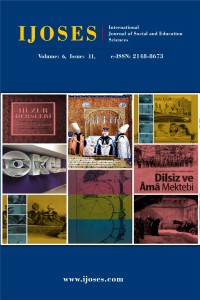Abstract
As the effects of
the world economic crisis continued in 1929, the Second World War began. This
situation has led to a more intense experience of the negative economic effects
of the war. During the war, the increase in military spending, the decrease in
production and imports created a heavy economic burden on the people. Inflation
created an economic crisis in the society, the shift of economic forces to the
military area caused decreases in agricultural production, as a result of the
shortage of food items, card applications began, there was a shortage of
places. Turkey, which tried to remain out of war with the start of the Second
World War, declared a mobilization. Although the declaration of mobilization
was considered as a measure of national defense against foreign threats, it has
led to a problem of occupation in the country as a result.
During the war
years, the war economy experienced conditions, and the governments who served
in these years tried various economic policies and tried to implement the war
economy. During the war years, the increase in defence spending and the loss of
labor affected the economy, and in such an environment, strict practices such
as national protection, asset tax and Land-Crop tax were required. In addition
to the taxes imposed during this period, domestic debt has also been forced. In
this study, Savings Bonds and national defense-oriented bonds, which are the
domestic borrowing practices of the state, were studied.
Keywords
References
- Akşam Gazetesi
- Ayın Tarihi
- Başbakanlık Cumhuriyet Arşivi
- Cumhuriyet Gazetesi
- Resmi Gazete
- TBMM Zabıt Ceridesi
- Ulus Gazetesi
- Ülkü Dergisi
- Vatan Gazetesi
- AKANDERE, Osman; (1998). Milli Şef Dönemi Çok Partili Hayata Geçişte Rol Oynayan İç ve Dış Tesirler 1938-1945, İz Yayıncılık, İstanbul.
- AYDEMİR, Şevket Süreyya; (1993). İkinci Adam, C. II, Remzi Kitabevi, İstanbul.
- BORATAV, Korkut; (1998). Türkiye İktisat Tarihi, Gerçek Yayınevi, İstanbul.
- CEM, İsmail; (1989). Türkiye’de Geri Kalmışlığın Tarihi, Cem Yayınevi, İstanbul.
- GÖKBUNAR, Ali Rıza - Hamza Kahriman; (2014). Karneli Yıllar Bir Savaş Maliyesi Uygulaması, Nobel Yayınları, Ankara.
- İNCE, Macit; (1996). Devlet Borçlanması (Kamu Kredisi), Seçkin Yayınevi, Ankara.
- KOÇAK, Cemil; (2007). Türkiye’de Milli Şef Dönemi (1938-1945), C. II, İletişim Yayınları, İstanbul.
- METİNSOY, Murat; (2007). İkinci Dünya Savaşı’nda Türkiye Savaş ve Gündelik Yaşam, Homer Kitapevi, İstanbul.
- PAMUK, Şevket; (2015). Türkiye’nin 200 Yıllık İktisadi Tarihi, Türkiye İş Bankası Kültür Yayınları, İstanbul.
- ÜNLÜÖNEN, Kurban; (1988). “Cumhuriyet Dönemi Devlet Borçları”, Dicle Üniversitesi Hukuk Fakültesi Dergisi, S. 4, ss:313-335.
Abstract
1929
Dünya Ekonomik Krizinin etkileri devam ederken İkinci Dünya Savaşı başlamıştır.
Bu durum savaşın olumsuz ekonomik etkilerinin daha yoğun biçimde yaşanmasına
neden olmuştur. Savaş yıllarında askeri harcamaların artması, üretimin ve
ithalatın azalması halkın üzerinde ağır bir ekonomik yük oluşturmuştur.
Enflasyon toplumda ekonomik bunalım oluşturmuş, ekonomik güçlerin askeri alana
kaydırılması tarımsal üretimde azalmalara yol açmış, besin maddeleri sıkıntısı
sonucunda karne uygulamaları başlamış, yer yer kıtlık yaşanmıştır. İkinci Dünya
Savaşı’nın başlamasıyla savaş dışı kalmaya çalışan Türkiye seferberlik ilan
etmiştir. Seferberlik ilanı dış tehditlere karşı milli müdafaa tedbiri olarak
değerlendirilse de sonuçları itibariyle ülkede iaşe sorunu yaşanmasına yol
açmıştır.
Ülke
savaş yılları boyunca savaş ekonomisi şartları yaşamış, bu yıllarda görev yapan
Hükümetler çeşitli ekonomi politikaları denemiş ve savaş ekonomisi uygulamaya
çalışmışlardır. Savaş yıllarında ülkedeki savunma harcamalarındaki artış ve
işgücü kaybı ekonomiyi etkilemiş, böyle bir ortamda Milli Korunma Vergisi,
Varlık Vergisi ve Toprak Mahsulleri Vergisi gibi katı uygulamalara gidilmek
zorunda kalınmıştır. Bu dönemde uygulamaya konulan vergilerin yanı sıra iç
borçlanmaya gidilmek zorunda da kalınmıştır. Bu çalışmada devletin iç borçlanma
uygulamaları olan Tasarruf Bonoları ve Milli Müdafaa İstikraz Tahvilleri
incelenmiştir.
References
- Akşam Gazetesi
- Ayın Tarihi
- Başbakanlık Cumhuriyet Arşivi
- Cumhuriyet Gazetesi
- Resmi Gazete
- TBMM Zabıt Ceridesi
- Ulus Gazetesi
- Ülkü Dergisi
- Vatan Gazetesi
- AKANDERE, Osman; (1998). Milli Şef Dönemi Çok Partili Hayata Geçişte Rol Oynayan İç ve Dış Tesirler 1938-1945, İz Yayıncılık, İstanbul.
- AYDEMİR, Şevket Süreyya; (1993). İkinci Adam, C. II, Remzi Kitabevi, İstanbul.
- BORATAV, Korkut; (1998). Türkiye İktisat Tarihi, Gerçek Yayınevi, İstanbul.
- CEM, İsmail; (1989). Türkiye’de Geri Kalmışlığın Tarihi, Cem Yayınevi, İstanbul.
- GÖKBUNAR, Ali Rıza - Hamza Kahriman; (2014). Karneli Yıllar Bir Savaş Maliyesi Uygulaması, Nobel Yayınları, Ankara.
- İNCE, Macit; (1996). Devlet Borçlanması (Kamu Kredisi), Seçkin Yayınevi, Ankara.
- KOÇAK, Cemil; (2007). Türkiye’de Milli Şef Dönemi (1938-1945), C. II, İletişim Yayınları, İstanbul.
- METİNSOY, Murat; (2007). İkinci Dünya Savaşı’nda Türkiye Savaş ve Gündelik Yaşam, Homer Kitapevi, İstanbul.
- PAMUK, Şevket; (2015). Türkiye’nin 200 Yıllık İktisadi Tarihi, Türkiye İş Bankası Kültür Yayınları, İstanbul.
- ÜNLÜÖNEN, Kurban; (1988). “Cumhuriyet Dönemi Devlet Borçları”, Dicle Üniversitesi Hukuk Fakültesi Dergisi, S. 4, ss:313-335.
Details
| Primary Language | Turkish |
|---|---|
| Journal Section | Research Articles |
| Authors | |
| Publication Date | June 15, 2019 |
| Submission Date | January 7, 2019 |
| Acceptance Date | February 22, 2019 |
| Published in Issue | Year 2019 Volume: 6 Issue: 11 - JUNE |
Indexes
Indexes
INDEX COPERNİCUS [ICI], Eurasian Scientific Journal Index [ESJI], ISAM [Makaleler Veri Tabanı], SOBIAD, Scilit, İdeal Online
tarafından dizinlenmekte.
TÜBİTAK/ULAKBİM(TR) SBVT tarafından izlenmektedir.


